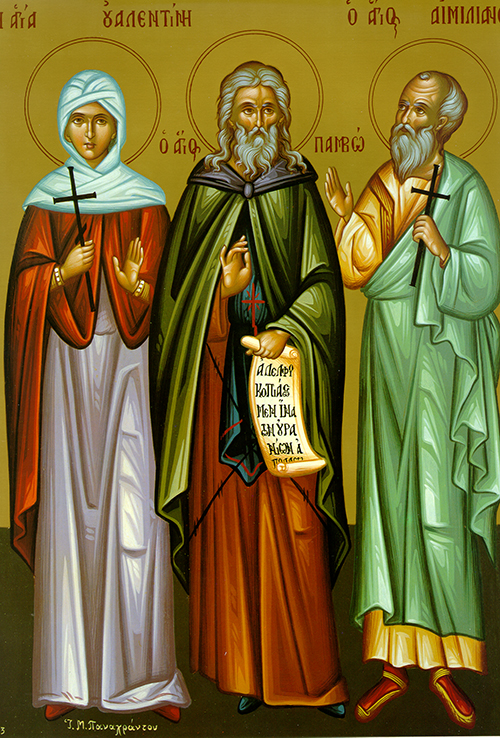

The holy martyr Hyacinth was born into a pious Christian family in the city of Amastridea (now Amastra in Anatolia). An angel that appeared gave him his name. As a three-year-old boy, St. Hyacinth asked God that a dead infant might be resurrected. The Lord hearkened to his childish prayer, and the dead one arose. Both lads afterwards grew up together, and they lived an ascetic life. St. Hyacinth once noticed how the pagans were worshiping a tree, and so he chopped it down. For this they subjected him to harsh tortures. They smashed out all his teeth, and having bound him with rope, they dragged him along the ground and threw him in prison. It was there that the holy sufferer departed to the Lord.
The holy martyr Emilian, who was a Slav, suffered for Christ during the reign of Emperor Julian the Apostate (361-363). Julian wanted to restore the cult of the pagan gods throughout the Roman Empire, and he issued an edict, according to which all Christians who failed to honor the pagan gods would be subject to death. Instead of being intimidated by these threats, St. Emilian’s faith in Christ was strengthened. The next day he went into a pagan temple and smashed the statues with a hammer. The governor ordered that St. Emilian be beaten mercilessly, and then to be burned alive. He did not perish when he was thrown into the fire, but instead the flames consumed many of the pagans who were standing about. When the fire had gone out, St. Emilian lay down upon the dying embers, and gave up his soul to the Lord. The wife of the pagan ruler was also a secret Christian, and she gathered up the saint’s relics and buried them. Afterward, a church dedicated to the holy Martyr Emilian was built at Constantinople, where his relics were transferred.
The venerable martyr Tarsykia Matskiv was a nun in the order of the Congregation of the Sisters Servants of Mary Immaculate. During the Second World War she was missioned in the Ukrainian city of Krystynopil. When the Soviet Army invaded the city in 1944, Sister Tarsykia was shot by a soviet soldier as she went to open the gates to welcome the priest coming to celebrate Divine Liturgy. She was buried in the garden of the convent under the statue of the Theotokos, as it was too dangerous to go to the cemetery. On September 2, 2007, Blessed Tarsykia’s mortal remains were exhumed, and ceremonially transferred to her hometown of Chodoriv, via the Cathedral of Stryj Eparchy. In silent procession, throngs of people escorted her relics, borne on the shoulders of priests, as pallbearers, to an outdoor Divine Liturgy, to accommodate these crowds, before being encrypted in the church itself. This was the funeral Blessed Tarsykia never had.
O Lord our God, your holy martyrs have deserved the crown of immortality on account of their good fight. Armed with your strength, they have vanquished their persecutors and crushed Satan’s dreadful might. Through their supplications, O Christ our God, save our souls.
Inflamed with the divine fervor, you were not afraid of the fire. You entered it willingly and were reduced to ashes in the flames. You went up like a sacrifice to the Master. O glorious martyr Emilian, pray for us.
1 Corinthians 4: 5-8
Brothers and sisters: Stop passing judgment before the time of the Lord’s return. He will bring to light what is hidden in darkness and manifest the intentions of hearts. At that time, everyone will receive his praise from God.
Brothers and sisters, I have applied all this to myself and Apollos by way of example for your benefit. May you learn from us not to go beyond what is set down, so that none of you will grow self-important by reason of his association with one person rather than another. Who confers any distinction on you? Name something you have that you have not received. If, then, you have received it, why are you boasting as if it were your own? At the moment you are completely satisfied. You have grown rich! You have launched upon your reign, that we might be reigning with you!
Matthew 13: 44-54
The Lord told this parable: “The reign of God is like a buried treasure which a man found in a field. He hid it again, and rejoicing at his find went and sold all that he had and bought that field. Or again, the kingdom of heaven is like a merchant’s search for fine pearls. When he found one really valuable pearl, he went back and put up for sale all that he had and bought it.
“The reign of God is also like a dragnet thrown into a lake, which collects all sorts of things. When it was full they hauled it ashore and sat down to put what was worthwhile into containers. What was useless they threw away. That is how it will be at the end of the world. Angels will go out and separate the wicked from the just and hurl the wicked into the fiery furnace, where they will wail and grind their teeth.
“Have you understood all this?” “Yes,” they answered; to which Jesus replied, “Every scribe who is learned in the reign of God is like the head of a household who can bring from his storeroom both the new and the old.”
When Jesus had finished these parables, he moved on from that district. Jesus next went to his native place and spent his time teaching them in their synagogues.
Icon courtesy of Jack Figel, Eastern Christian Publications – ecpubs.com
Thursday, July 17 –